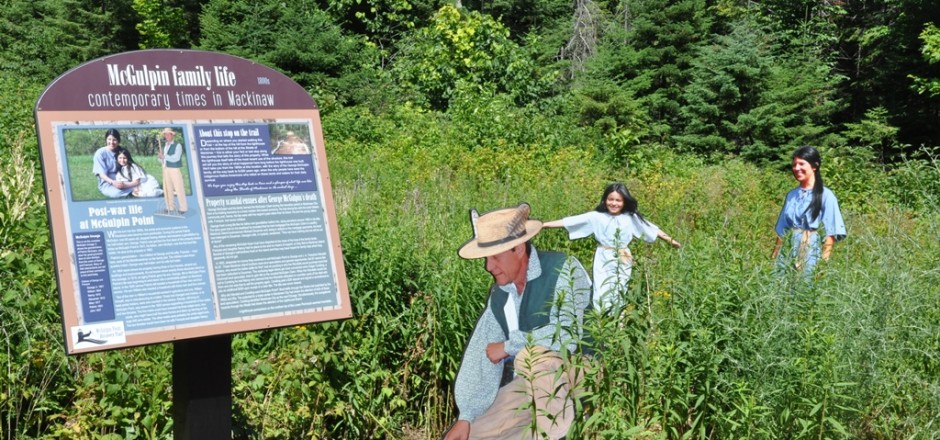CMU Professor to speak on archaeological digs at McGulpin Point
Sarah Surface-Evans, Ph.D. will speak to the Mackinaw Area Historical Society at 7:30 p.m. on Monday, May 13, 2013, on the results of recent archaeological investigations of Heritage Village Park by Central Michigan University students.
Evans, the principal investigator in the project last August, will present her findings at 7:30 p.m. in the Mackinaw Area Public Library, located at 528 W. Central Ave in Mackinaw City. The public is invited, and refreshments will be served.
Evans said in an interview that she will discuss the findings in the archaeological and environmental context of the park, a joint venture of the Historical Society and the Village of Mackinaw City located about two miles west of the center of Mackinaw City.
The research at Heritage Village was conducted with support from both the society and Mackinaw City. Evans said the goal was to learn more about the site that was encountered accidentally when a demonstration garden was plowed on the park property.
She said the presence of European trade goods previously recovered suggested that the site dated to the colonial era and may be associated with the French or British settlement of Fort Michilimackinac, located several miles northeast on the Straits of Mackinac.
“We were able to confirm the location and presence of this site. Our team also investigated several other areas of the (Heritage Village) park in order to assess whether there were historic or prehistoric sites at these locales,” she said.
“However, our excavations recovered no evidence of buildings or indications of a settlement,” she said, adding that all landforms at Heritage Village are natural dunes that appear to be the result of natural geological processes.
She said investigations at Heritage Village have concluded at this time, although there is a possibility that future investigations may be conducted at other portions of the park property.
“Unfortunately it is impossible to draw further conclusions about the colonial site, because unknown individuals removed artifacts and damaged the site in the process,” she said.
However, she said the research that CMU conducted was still useful for several reasons:
“First, while the findings regarding the colonial site are rather limited, we were able to confirm the presence of the site and that it was likely related to the Fort; second, we were able to determine that the two hills investigated on the park property were natural dunes, not cultural constructions. This information will allow the MAHS and Village of Mackinaw City to better plan future development of the park without worry that they will damage a cultural site; and third, CMU students learned valuable skills and experience while conducting these investigations.”
She said the MAHS and Village of Mackinaw City should be commended for their efforts to promote historical education, outreach, and preservation at the Heritage Village.
“CMU is committed to assisting the MAHS and Village of Mackinaw City with these goals. Hopefully our combined efforts will continue to positively influence visitors and area residents to protect the region’s significant history,” she concluded.
When she conducted the project as principal investigator, Evans was a post-doctoral fellow at CMU, in the Department of Sociology, Anthropology, and Social Work. She conducted research with the group of CMU students at both Heritage Village, and as a separate project, at McGulpin Point Lighthouse, one-half mile north and owned by Emmet County.
She said the research at McGulpin Point was aimed determining the location of the former barn that once stood at the lightstation and assessing whether materials from the lighthouse era were still present and could tell them something about the history of the lightstation.
In June 2013, she will again lead a group of field school students from CMU, who will be conducting research at several properties owned by Emmet County.








